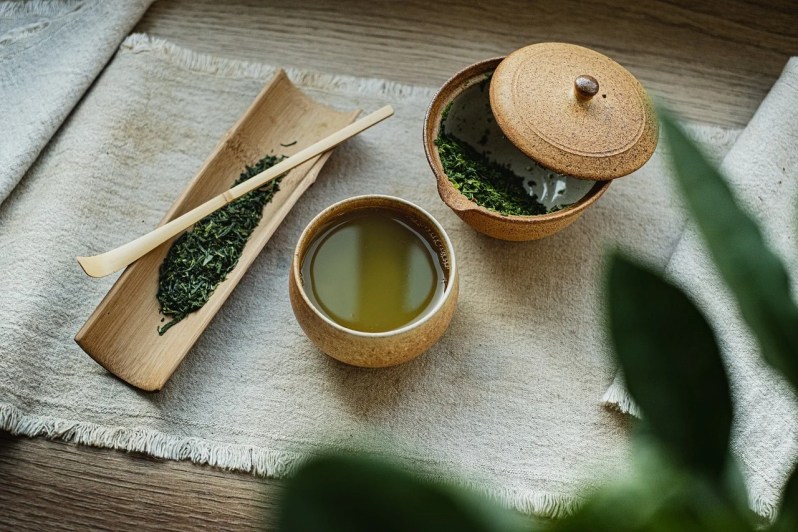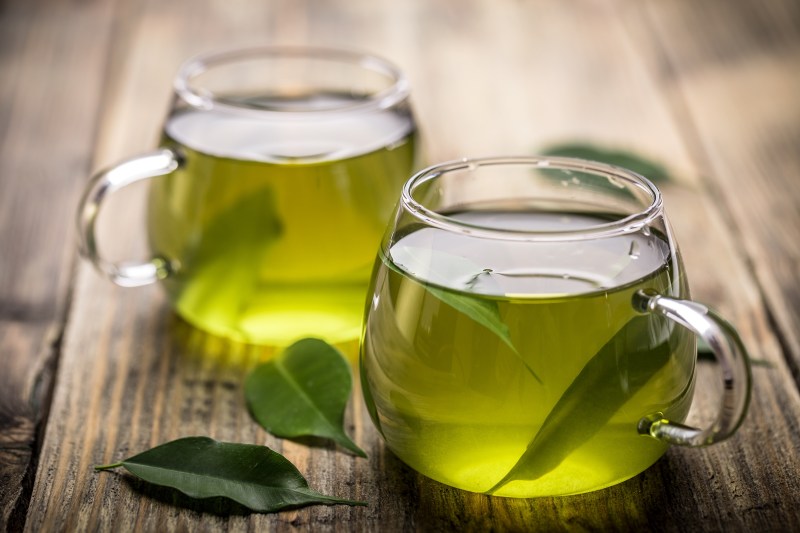
Coffee tends to be the way most of us start our day. Its warm caffeine rush hits our veins like a drug and helps pull us from our sleepy stupor. For this, delicious coffee, we are thankful. But if you’re looking for a health boost, it may be time to switch up your go-to AM caffeine jolt. Green tea has been sipped for centuries and is even revered in some parts of the world for its wealth of health benefits.
While green tea certainly has a different flavor profile than coffee and may take some getting used to, many green tea drinkers who were initially lukewarm toward the beverage come to savor every sip. Moreover, you don’t necessarily have to give up your favorite cup of joe to add green tea — and all its associated benefits — to your diet. So, push your favorite cold brew aside for just a few minutes, and keep reading to learn about the top green tea benefits.

What is green tea?
After water, green tea is the most consumed beverage worldwide. It is made by steeping the dried leaves of the Camellia sinensis bush. In fact, all non-herbal teas are made from leaves from this same bush. The only difference between teas (for example, black tea versus green tea) is the level of oxidation of the leaves before they are dried. Green tea is made from unoxidized leaves, which makes it particularly rich in antioxidants and polyphenols, and one of the least processed forms of tea available.

Benefits of green tea
The health benefits of green tea have been studied extensively. Most green tea health benefits are due to the high levels of polyphenols in the leaves. Most green tea is roughly 30% polyphenolic compounds by weight. So keep reading and finally answer the question, “Is green tea good for you?”
1. Green tea can help you lose weight
Weight loss is at the top of the list of health goals for many guys, and if you’re in that group, here’s a strong case for green tea—it has been shown to increase metabolic rate and fat burning. Coupled with the caffeine, the catechins in green tea increase energy metabolism, boosting the rate that your body burns calories, even at rest. Studies have also demonstrated the ability of green tea to promote fat loss, particularly in the abdominal area, even in the absence of a significant calorie deficit. Though the most effective way to lose weight typically involves following a healthy, calorie-controlled diet with regular physical activity, adding green tea to your weight loss plan may accelerate your results.
2. Green tea reduces inflammation
Green tea is rich in a compound called epigallocatechin-3-gallate (EGCG), which is well documented to have anti-inflammatory properties. Topical application of green tea extract has been shown to improve inflammatory skin conditions like psoriasis, and green tea consumption has been found to reduce arthritis pain. Furthermore, many of the disease-fighting benefits of green tea are due to the anti-inflammatory effects of the EGCG.
3. Green tea reduces the risk of certain cancers
Green tea is full of antioxidants, which act as free radical scavengers and reduce oxidative damage in the body. In doing so, antioxidants can prevent some of the cellular damage that can lead to certain cancers. Green tea consumption has been associated with reducing the risk of breast, bladder, stomach, ovarian, lung, colorectal, skin, prostate, and esophageal cancers.
4. Green tea can improve heart health
Research has concluded that green tea can reduce the risk of heart disease, stroke, and other cardiovascular diseases. This is thought to be attributable to the polyphenols in green tea, which can lower blood pressure, decrease inflammation, improve epithelial function, and lower cholesterol, all of which are risk factors for cardiovascular disease.
5. Green tea can lower the risk of diabetes
Some studies have found an inverse correlation between green tea consumption and diabetes risk. Green tea may help regulate blood sugar levels and increase insulin sensitivity, thus improving glycemic control. These effects seem particularly potent when coupled with the Mediterranean diet.
6. Green tea can boost brain function
Green tea naturally contains caffeine, which can increase attentiveness, alertness, and cognitive performance, and decrease reaction time. These stimulant effects of caffeine occur because caffeine blocks an inhibitory neurotransmitter known as adenosine. In doing so, caffeine increases firing rates between neurotransmitters, as well as the concentration of dopamine and other neurotransmitters. Green tea also contains L-theanine, an amino acid that further increases dopamine levels and works synergistically with caffeine to improve brain function.
7. Green tea can slow cognitive decline
Compounds in green tea also seem to improve working memory and slow the rate of cognitive decline. Some studies have demonstrated the ability of green tea to reduce the risk of dementia and Alzheimer’s disease.
8. Green tea can increase longevity
Given the litany of benefits associated with drinking green tea, it may come as no surprise that green tea also seems to increase overall longevity and reduce the risk of all-cause mortality. One large-scale, 11-year study found that the highest consumption level of green tea (five cups per day) was associated with the lowest risk levels for all-cause mortality and mortality due to cardiovascular disease.

What foods pair well with green tea?
Green tea’s subtle, grassy, and slightly bitter flavor profile makes it a versatile beverage that pairs well with a variety of foods. Depending on the specific type of green tea and your personal preferences, here are some delicious pairings to explore.
- Salads: Green tea’s clean flavor complements the freshness of leafy greens and vegetables in salads. Dressings with citrus or vinegar also pair well.
- Seafood: The delicate taste of green tea enhances the sweetness of fish and shellfish. Sushi, steamed white fish, or grilled shrimp are excellent choices.
- Chicken and poultry: Light chicken or poultry dishes with simple preparations like grilling or roasting pair well with the subtle character of green tea.
- Fruit: Green tea’s acidity can balance the sweetness of fresh fruits like berries, melon, or citrus. Fruit salads or light fruit desserts are excellent pairings.
- Pastries and cookies: The bitterness of green tea can cut through the sweetness of baked goods like muffins, scones, or shortbread cookies. Opt for unsweetened or lightly sweetened options.
- Chocolate: Dark chocolate with a high cacao content (70% or higher) can create an interesting contrast with the bitterness of green tea.
Editors' Recommendations
- Black tea vs. green tea: Which offers more benefits?
- Bourbon snifters: What they’re good for, which bourbon you should drink from them, and more
- Here are the benefits of taking vitamin D supplements – what you should know
- How to lose weight: Eat these foods that help you feel fuller longer
- 5 benefits of healthy fats and which ones you should be eating




